1. Respect the Hookup Boundaries
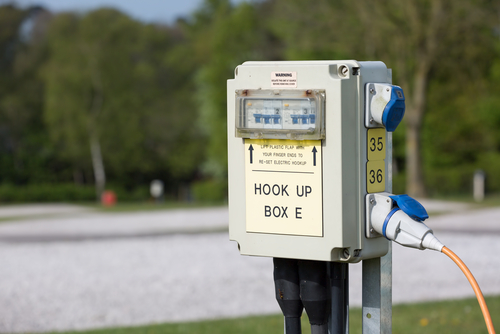
Every RV site has its own water, sewer, and power hookups, and crossing over into someone else’s area to connect or walk through is bad form. It’s basically like cutting through someone’s living room uninvited. Even if there’s a shortcut, use the roads or designated paths instead. Keeping to your space is part of that unspoken campground respect code.
Hookup etiquette also means not monopolizing shared dump stations. Get in, do your business, and move along so the next person doesn’t have to wait in line behind your chat session. If your hose leaks or you spill, clean it up—nobody wants to step in mystery fluids. Treat every shared area like you’re borrowing it from a friend, not testing its limits.
2. Quiet Hours Actually Mean Quiet
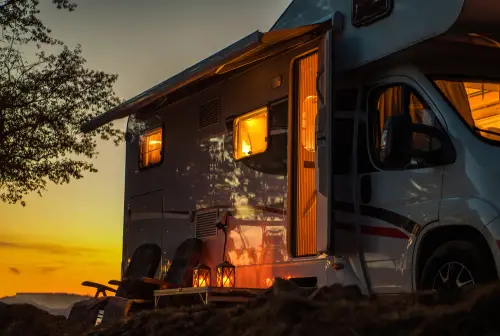
Every campground posts quiet hours for a reason, usually from around 10 p.m. to 6 a.m., but somehow, that’s when someone decides it’s time for karaoke. Sound travels far in open spaces, and even a normal conversation around a fire can echo into someone’s tent or RV bedroom. Generators, music, or even loud laughter can keep half the campground awake. If you need power or want to hang out late, plan ahead and use low noise options or head into town instead.
It’s not about being the “fun police”—it’s about respect for other campers who might be up early hiking, fishing, or traveling. When one person breaks the rule, it gives others permission to do the same, and soon the whole campground sounds like a parking lot tailgate. Keeping noise down helps maintain that peaceful, nature-soaked vibe everyone came for. You’ll be surprised how much better the stars look when you can actually hear the crickets.
3. Your RV Lights Don’t Need to Be a Vegas Marquee

Those bright LED light bars and awning strips look great on Instagram, but they’re a nightmare for your neighbors trying to stargaze. Light pollution ruins night vision and can even attract bugs to other people’s campsites. Campgrounds are meant to let you see the stars, not to make the place look like a Walmart parking lot. Turn off exterior lights when you don’t need them or switch to amber bulbs that are easier on the eyes.
If you’re worried about safety or finding your way back, use a small motion light or solar path markers instead. Overlighting not only spoils the view, but it messes with the natural rhythm of nocturnal animals nearby. A dark, calm site helps everyone relax—and makes your own firelight glow that much cozier. Think rustic charm, not runway landing strip.
4. Fire Rings Are Not Trash Cans
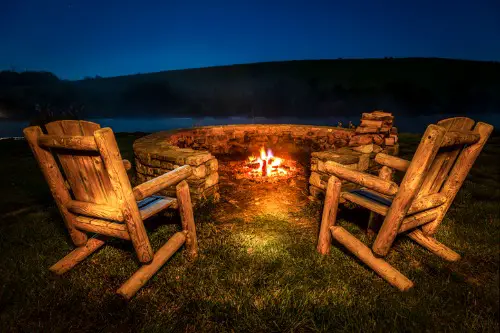
You’d be amazed how many people treat fire pits like ashtrays or incinerators. Burning plastic, cans, or foil not only stinks up the whole campground but releases toxic fumes. Fire pits are for wood and paper only, and leaving trash behind makes it harder for the next campers to use them. Plus, melted debris can permanently damage the fire ring.
Always let your fire burn down completely, then douse it with water until it’s cool to the touch—no smoke, no steam. The number of wildfires caused by “almost out” campfires every year is staggering. Proper fire etiquette isn’t just about manners—it’s about safety for everyone. If you can’t sit by your fire responsibly, it’s not ready to be left.
5. Don’t Cut Through Other Campsites
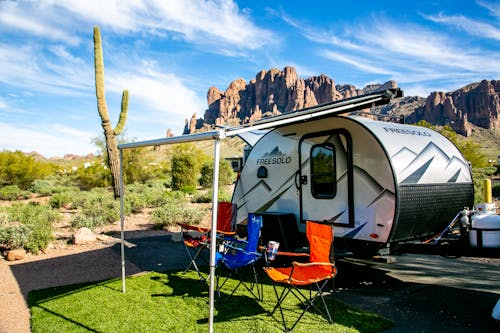
This one’s simple but often ignored. Even if someone’s site looks unoccupied or you’re “just passing through,” it’s still their space. Campers set up chairs, tables, and gear in certain spots for a reason—it’s their temporary home. Walking through uninvited feels just as intrusive as someone strolling through your backyard.
It’s tempting when your friend’s campsite is “just over there” or the bathhouse is faster that way. But those small detours wear down the grass, invade privacy, and can even cause safety issues with pets or kids. Take the long route and enjoy the walk—part of camping is slowing down anyway. Think of those boundaries as invisible fences for peace of mind.
6. Keep the Generator Hours Sacred
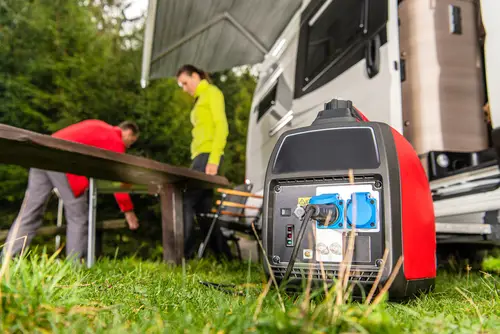
Generators are a lifeline for RVers, but they’re also one of the top noise complaints in campgrounds. Most parks have posted generator hours, usually mid-morning to early evening. Firing yours up at 6 a.m. to make coffee is a guaranteed way to make enemies. Noise pollution carries, and even “quiet” generators aren’t really that quiet at 2 a.m.
Plan your power use around those hours—charge batteries during the day, and conserve energy at night. Consider investing in solar panels or lithium batteries if you camp often off-grid. It’s not just courtesy—it’s part of learning to camp smarter and more sustainably. No one ever woke up in the woods hoping to hear a small engine revving nearby.
7. Control Your Pets (and Clean Up After Them)

Dogs love camping too, but not everyone loves your dog the same way you do. Keep them leashed unless you’re in a designated off-leash area, and don’t assume everyone wants a visit. Constant barking echoes through campgrounds and stresses out other animals. Always pick up after your pet—yes, even in the woods.
Leaving waste behind contaminates soil and waterways, especially near campsites or trails. It’s also a major reason some campgrounds have banned pets altogether. If your dog can’t handle being around strangers or other animals, give them a break in the RV instead of forcing the issue. Responsible pet owners keep campgrounds pet-friendly for everyone.
8. Mind Your Gray Water
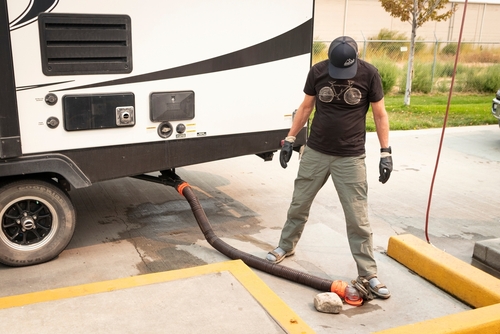
Dumping gray water (the stuff from your sink or shower) on the ground might seem harmless, but it can cause serious sanitation and environmental problems. Soap and food waste attract wildlife and can seep into groundwater. Many campgrounds have clear rules against it for that reason. Always dispose of it at an approved dump station or sewer hookup.
If you’re boondocking or dry camping, use biodegradable soap and collect gray water for proper disposal later. Some rigs have holding tanks designed for exactly this purpose—use them. Gray water might look clean, but it’s not. If everyone “just dumped a little,” the whole campground would smell like a soggy dish rag.
9. Leave No Trace—Even the Little Stuff
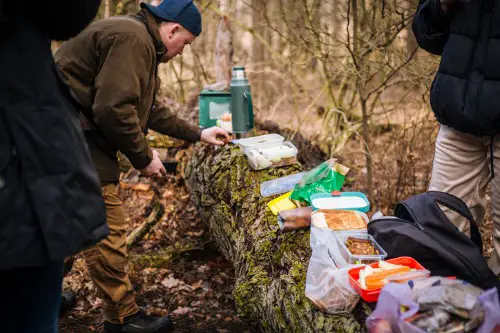
It’s easy to think a few bread crumbs or twist ties don’t matter, but they do. Animals can choke on food scraps, and micro-trash adds up fast in shared spaces. Campgrounds are only as clean as the people who use them. The “leave no trace” rule isn’t just for backcountry hikers—it applies to RV parks and glamping spots too.
Before you leave, do a quick sweep of your site. Check under tables, around fire rings, and near hookups. Those forgotten bits of foil or bottle caps make the next visitor’s experience worse. A clean site is a sign you cared enough to keep nature as beautiful as you found it.
10. Respect the Bathhouse
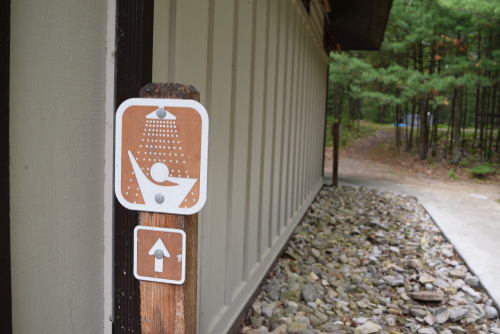
Campground bathrooms and showers are shared by everyone, and the least you can do is leave them usable. That means wiping down surfaces, not hogging the water, and reporting clogs or messes to staff. Many people rely on these facilities as their only bathroom while camping, so a little courtesy goes a long way. Nothing ruins a morning faster than finding someone’s soap scum still waiting for you.
Avoid washing dishes or clothes in sinks meant for hands. That kind of misuse leads to blockages and attracts pests. Bring your own cleaning supplies and sandals—both for hygiene and to speed up your routine. The faster and cleaner you are, the better it is for everyone waiting their turn.
11. Campfires Are a Group Effort
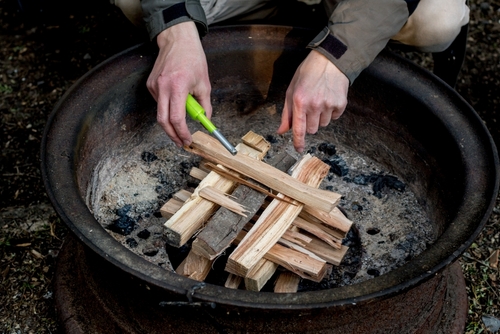
If there’s a shared fire pit or community area, be considerate about how you use it. Don’t hoard the spot all night if others are waiting, and definitely don’t show up and take over someone else’s fire. Fires bring people together, but only when everyone gets a fair chance to enjoy them. Sharing warmth shouldn’t come with territorial battles.
Always keep water nearby and make sure the fire stays under control. If the weather’s windy or dry, skip the fire altogether—it’s not worth risking a forest blaze. The person who ignores a burn ban isn’t being “rugged”; they’re being reckless. Real campers know when to say no to flames.
12. Don’t Feed the Wildlife
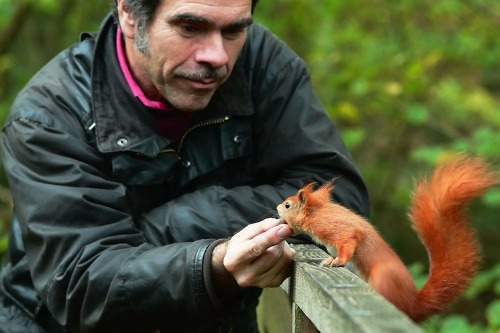
It might seem cute to toss a cracker to a squirrel or a scrap to a raccoon, but it causes real harm. Animals lose their natural fear of humans and start depending on food from campsites. That can lead to aggression, disease spread, and even animal euthanasia when they become “problem wildlife.” What feels kind is actually cruel in the long run.
Store all food securely, especially in bear country or anywhere with scavengers. Even pet food and cooking grease can attract unwanted visitors. Feeding animals also draws them closer to roads and RVs, which leads to accidents. If you love wildlife, admire it from a distance and keep your snacks to yourself.
13. Remember: You’re Sharing the Space
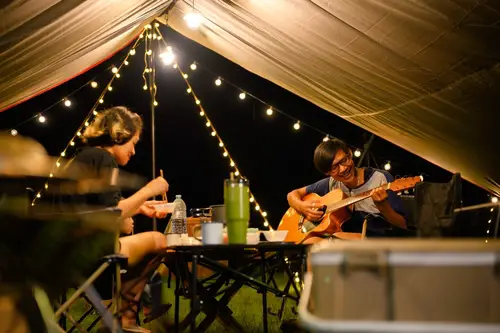
The best campers understand that campgrounds are communities, not personal kingdoms. Your music, lights, smells, and habits ripple out to affect others. Whether you’re in a tent, a van, or a 40-foot fifth wheel, the same basic principle applies—leave space for others to enjoy their own version of the outdoors. Courtesy is what makes camping work for everyone.
It’s easy to forget these rules when you’re caught up in having fun or feeling “away from it all.” But etiquette isn’t about rules for rules’ sake—it’s about preserving that balance between freedom and respect. The more mindful you are, the better the entire experience becomes. Nature rewards those who tread lightly and act kindly.
This post 13 Camping Etiquette Rules Everyone Pretends Don’t Exist Until It’s Too Late was first published on Greenhouse Black.
